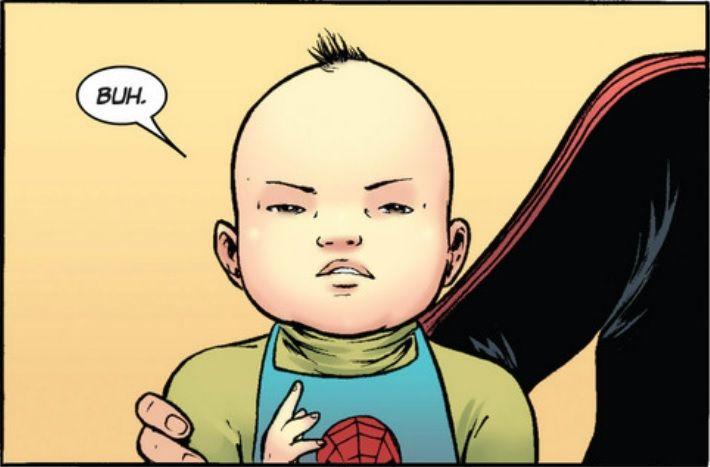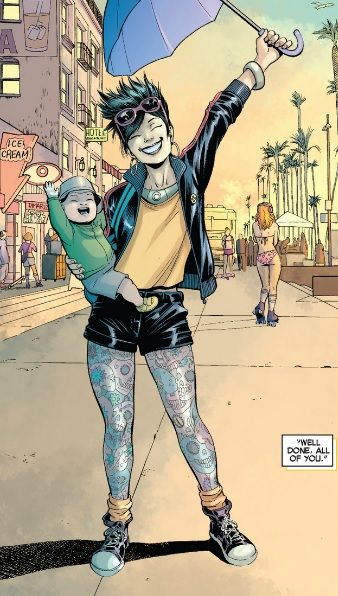Comics love kids. Whether as protagonists or antagonists or (especially) readers, comics have a long-established history with the young and young at heart. Youth are blessed with innocence and wonder, easily fitting into fantasy situations without fail and delighting in the escapism that most "grown-ups" would dismiss with cynicism or disbelief. It's an easy starting point for a story to begin in a character's youth or with the cliche "I was born ...," because it's something everyone reading can relate to. We can all shout, "Hey, I was born once, too!" and suddenly everyone's on the same page.
So, it sort of makes sense that comics hate parents. Any chance they get, parents are abusive, neglectful, swept off stage or, frequently, killed. Having parents around limits a character's independence. They drag a "real world" sensibility into fantastic situations where we all have to wonder who are the people putting these kids up at the Jean Grey School for Higher Learning, taking us out of the fun of just having a super-powered school in the first place. Parents also tend to prove that kids don't really "know everything," and can put a damper on the adventurous spirit that kid superheroes require. And, let's face it, not everyone has been a parent and, sadly enough, not everyone has had parents that stuck around. Aside from some debatable exceptions (and one awesome mom in Sue Storm), parents don't get panel time in comics unless they are an obstacle to overcome.
When Jubilee became a vampire in the X-Men event "Curse of the Mutants," I figured that would be the end of the character for a while. Not that vampires aren't interesting, it just slows down what you can do with them if you decide to stick to the rules (aversion to sunlight, the need for blood, etc.) She'd fade to the background, show up for special events that might make use of her new vampiric abilities and not need to explain why she's out during the day. However, X-Men #4 really puts the stake through the Sparkler's heart by effectively killing off the character by making her ... a mom.
WARNING: Talking specifics about X-Men #4 as well as spoiling a small plot point of the past three issues in the last sentence. Whoops. Dare you read on?
In Brian Wood's new all-female X-Men title, Jubilee started off the show by appearing on her friends' doorstep with a baby. Turns out the infant was an orphan and wrapped up in a crazy plot that would make him a host for an oncoming villain, so this new team takes on the job of protecting the child and going on an adventure. By the end fo the story, the baby is saved and Jubilee comes to the conclusion that she's keeping the child to raise as her own. She names him Shogo and that is that.
In this most recent issue, Jubilee takes Wolverine on a tour through her own personal Los Angeles, showing him the place where she started. As Jubilee sits feeding Shogo PCU noodles in the food court she used to haunt, she and Logan look back at how she joined up with the X-Gang and note the distance between then and now. From the beach she used to frequent to the house where she once had parents to the mall where she used to rat around, all of what we've seen is Jubilee's past, and she tells him so. "... But all these spots are important to me, they live inside me somewhere for sure. At the end of the day, though, it's not home anymore. That's with you guys. Wherever that may be." It's a classic understanding of the kid adventurer, someone who left the mundane behind for the fantastic. Their origins are always integral to their character, but no one focuses on the fact that Scott Summers was pushed out of a plane when he was a kid or that Captain America was a scrawny nobody as a teen; we know them better and more fondly as the superheroes they are today.
A more sentimental Wolverine tells Jubilee that she'll make a great mom, which seems like a weird step backward for the character. When we've just finished talking about how the carefree life of following mutants into the Outback is what gave Jubilee her family and how her roots don't factor into her life anymore, Logan encourages her to settle down. After seeing her childhood home for sale in Beverly Hills, Logan buys it for her on the sly despite her disinterest. Unless the Beverly Hills home is going to be this new X-Team's base camp, it's a very nice place to put away Jubilee for the long term.
Character-wise, it makes sense: Logan is fond of Jubilee and would rather see her live a full and happy life than lead the adventurous and insane one an X-Man gets. She lost her powers, nearly died at the hands of Omega Red and was turned into a vampire -- I'm sure Logan just sees more dire threats to her life in the future and wants to head them off. Being a parent should curb any reckless tendencies and ground her emotionally; maybe she'll survive to see another birthday. As a reader and X-enthusiast, all I can see is Jubilee saying goodbye. Yes, becoming responsible and more mature is great character growth, but it limits what you can do as a superhero.
Superheroes are unencumbered, for the most part, able to drop everything at a moment's notice to travel to space and save the day. Babies require care and change your perspective on what's important -- and finding a babysitter for a space adventure is out of the question. The best-case scenario is that she continues to ride with the team, and the baby becomes a dangling subplot, pulled out for dramatic purposes and put back when it hampers the action. The worst-worst case scenario is that something terrible happens to Shogo, requiring Jubilee to seek revenge. Both of these are horrible ideas. and Wood is far too solid a writer to let things drift in those directions. So what's next?
We hate to see our heroes grow up. It reminds us of reality and limits their ability to be there for us when we need them. The letters page of this issue has fans excited about seeing more of Jubilee, and while editor Jeanine Schaefer promises we'll see more of the character's new vampiric power set in the future, I’m more curious about how much we’ll be seeing of Jubilee herself. This direction for the character seems less Sue Storm and more Jessica Jones; she won’t be the power mom the Invisible Woman rose to prominence as, but Jubilee will certainly have a lot to learn, a huge extended family of heroes for help and conflicts that are more about her than what the villain du jour is doing. Being a parent might not make you a superhero in the classical sense, but it does challenge you to be a better, stronger person than you've ever had to be in your life. This is goodbye to the Jubilee we all grew up with, but it’s also hello to the Jubilee we could become.



